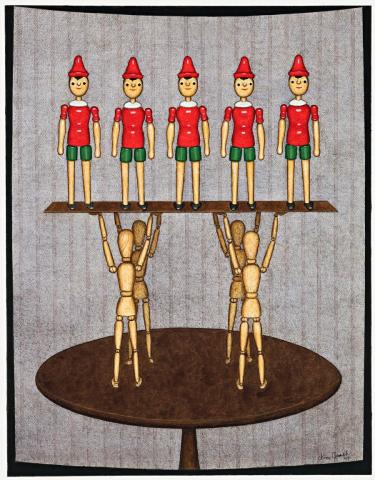ON STAGE, 1991
John Brack
watercolour, pen and ink on paper
90.0 x 70.0 cm
signed and dated lower right: John Brack / 1991
inscribed verso: ON STAGE
Private collection, Melbourne
A Question of Balance: John Brack 1974–1994, Heide Museum of Modern Art, Melbourne, 1 April – 28 May 2000
Gott, T., A Question of Balance: John Brack 1974–1994, Heide Museum of Modern Art, Melbourne, 1 April – 28 May 2000, p. 47
'John was getting older, and so he was starting to think of the future - not his future but the future. And when the 1980s came (and it did synchronize with grandchildren coming) there was a realising that it was the same again - we'd very much seen this, been there. That was the beginning of his making of an image for perpetuation.'1
Acutely aware of his own frailty and the inevitability of death, during the early 1990s Brack sought an image to describe this chapter of human experience - one that would encapsulate the continuation of life, the perpetual cycle of renewal as one generation succeeded the next. Accordingly, where the rough and tumble of schoolyards, the antics of jockeys and horseracing, the mundane icons of urban reality and the rigours of ballroom dancing - to name but a few - had previously afforded a platform for investigating the human condition, now in his final meditations exemplified by On Stage, 1991, it is the stylised, flesh-coloured manikins and Pinocchio dolls which serve as a visual metaphor for people. As Christopher Heathcote intuitively argued at the time of the series' inaugural exhibition, '...The cipher-like unpainted dolls appear to denote psychologically unformed children; the Pinocchios, youngsters playing at being adults...[it is] an allegory for children learning social rituals, with each doll practicing [sic.] how to behave and interact with others.'2
Inspired by the children's film that had so captivated his grandson, the Pinocchio motif specifically celebrates Brack's relationship with the first boy in his family after a life spent surrounded by the female element (a wife, four daughters and grand-daughters). More universally perhaps, the figure alludes to the male force in life and its playful innocence prior to the dangerous games of adulthood - a darker message elucidated by works such as Eleven Pinocchios, 1990, which, with its dolls lined up rigidly in a row, implies the loss of boyish innocence and individuality consequent upon the conformity of social conditioning.
While the present work features a similarly regimented row of five Pinocchio dolls, significantly however, here they are nurtured by supportive figures - protected from the blackness of the composition's external void by the caring balance of older generations. Embodying hope and acceptance of the greater replenishing cycles of life, thus the watercolour bears strong affinities with the culminating oil of the series- On Stage, 1993, in which five manikins (one large denoting his wife and four smaller, his children) are juxtaposed alongside the male Hands of Authority (the artist) on a round marble table (the circle of life). Although tinged with personal darkness, indeed such works are eloquent testimony to the artist's ultimate faith that life would continue as it always had, whether he was here or not: '...when John looked at our daughters, as mothers, he didn't see them, he saw me, and their children - his grandchildren - he saw our children. There was an interchange of generation, of continuation, the Patterns of Perpetuation, that life goes on and repeats itself, even as the blinds come down.'3
1. Helen Maudsley cited in Gott, T., A Question of Balance: John Brack 1974 - 1994, Heide Museum of Modern Art, Melbourne, 2000, p. 34
2. Heathcote, C., 'Still demanding and illusory', The Age, Wednesday 1 June 1994
3. Helen Maudsley cited in Gott, ibid., p. 41
VERONICA ANGELATOS
